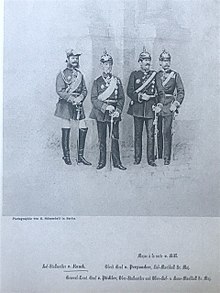Hermann Erdmann Konstantin von Pückler

Count Hermann Erdmann Konstantin von Pückler-Groditz (born December 23, 1797 in Hohlstein , Löwenberg district in Silesia , † June 14, 1892 in Berlin ) was a Prussian infantry general and chief court and house marshal and chief stable master of the king and later emperor Wilhelm I.
Life
origin
His parents were Friedrich Johann Ludwig Erdmann von Pückler (born January 26, 1756 - † November 11, 1806) and his wife Auguste Christiane Charlotte, born von Erlach (born November 7, 1767 - † February 22, 1817), a daughter of the general Friedrich August von Erlach . His father was a royal Prussian Premier Lieutenant from the 40th Infantry Regiment and heir to Gimmel. His brothers Friedrich Wilhelm August Erdmann (1786-1856) and Wilhelm Erdmann Karl August (1790-1859) became Prussian lieutenants general .
Career
He came to Berlin on May 20, 1811 as a cadet . From there he was transferred to the 2nd Guards Regiment on April 21, 1815 as a second lieutenant on foot . In the summer campaign of 1815 , the regiment made its way to Paris, but the war was over before it had to intervene. Promoted to Premier-Lieutenant on April 23, 1822, he was made captain on October 13, 1827, but left the army at the same time and was allowed to keep his uniform. He then became chamberlain to Princess Karl of Prussia. Nevertheless, on September 6, 1829 he was still captain in the III. Battalion of the 20th Landwehr Regiment. In 1831 he received the Prussian Order of St. John and the Knight's Cross of the Weimar Order of Falcons . In 1835 he became court marshal of Prince Wilhelm of Prussia (son), and he received the Russian Order of St. Anne, 2nd class with diamonds . On April 14, 1838 he was made major and leader of the 2nd contingent of III Battalion of the 24th Landwehr Regiment appointed. On March 30, 1844 he got the character as a lieutenant colonel. In 1847 he received the Order of the Red Eagle 2nd Class with Oak Leaves , the Commander's Cross of the Brunswick Order Henry the Lion 1st Class , the Hanoverian Guelph Order 1st Class and the Russian Order of St. Vladimir 3rd Class . On October 24, 1848, he was released from the leadership of the 2nd contingent and instead aggregated into the battalion. During the Baden Revolution he was on the staff of the Prince of Prussia and took part in the battles at Ubstadt , Bruchsal, Durlach , Muggensturm and Kuppenheim. For the siege of the fortress Rastatt he received the swords of the Red Eagle Order. On November 6, 1850 he was then à la suite of III. Battalion of the 24th Landwehr Regiment. On June 6, 1854 he was given the character of a colonel and took his leave on September 30, 1858 as major general. He was then classified on September 30, 1858 in the category of officers available for disposition . On March 22, 1861, he was then chief court and house marshal as well as chief stable master of the king and later emperor Wilhelm I, on March 22, 1863 he also received the character of lieutenant general and on April 26, 1865 was again an officer of the army counted.
During the German War of 1866 he was in the Army Headquarters and also took part in the Battle of Königgrätz . During the Franco-Prussian War of 1871/71 he was also in the main headquarters. He took part in the Battle of Gravelotte and the Siege of Paris (1870–1871) . During the siege he also earned the Iron Cross 2nd class .
After the war he was awarded the Order of the Black Eagle on April 26, 1875 , and on March 22, 1877 he was also given the character of General of the Infantry. On December 24, 1885 he took leave of the court office and received the diamonds for the Order of the Black Eagle. He died in Berlin on June 14, 1892.
In his assessment, General Weyrach wrote in 1847: Skilful, educated staff officer, capable and very useful, who shows desire and love for service and has led a Landwehr battalion several times, thereby setting a fine example. Suitable for battalion commander.
family
He married Charlotte Wilhelmine Poltz (born November 9, 1811, † April 15, 1880). The marriage remained childless.
literature
- Kurt von Priesdorff : Soldier leadership . Volume 7, Hanseatische Verlagsanstalt Hamburg, undated [Hamburg], undated [1939], DNB 367632829 , pp. 204-205, no. 2245.
- Gothaisches genealogical pocket book of the count's houses , Volume 36, Justus Perthes , Gotha 1863, p. 674 .
Web links
| personal data | |
|---|---|
| SURNAME | Pückler, Hermann Erdmann Konstantin von |
| ALTERNATIVE NAMES | Pückler-Groditz, Hermann Erdmann Konstantin von; Pückler, Hermann von |
| BRIEF DESCRIPTION | Prussian general of the infantry and upper court and house marshal of the king and later emperor Wilhelm I. |
| DATE OF BIRTH | December 23, 1797 |
| PLACE OF BIRTH | Hohlstein , Löwenberg district in Silesia |
| DATE OF DEATH | June 14, 1892 |
| Place of death | Berlin |